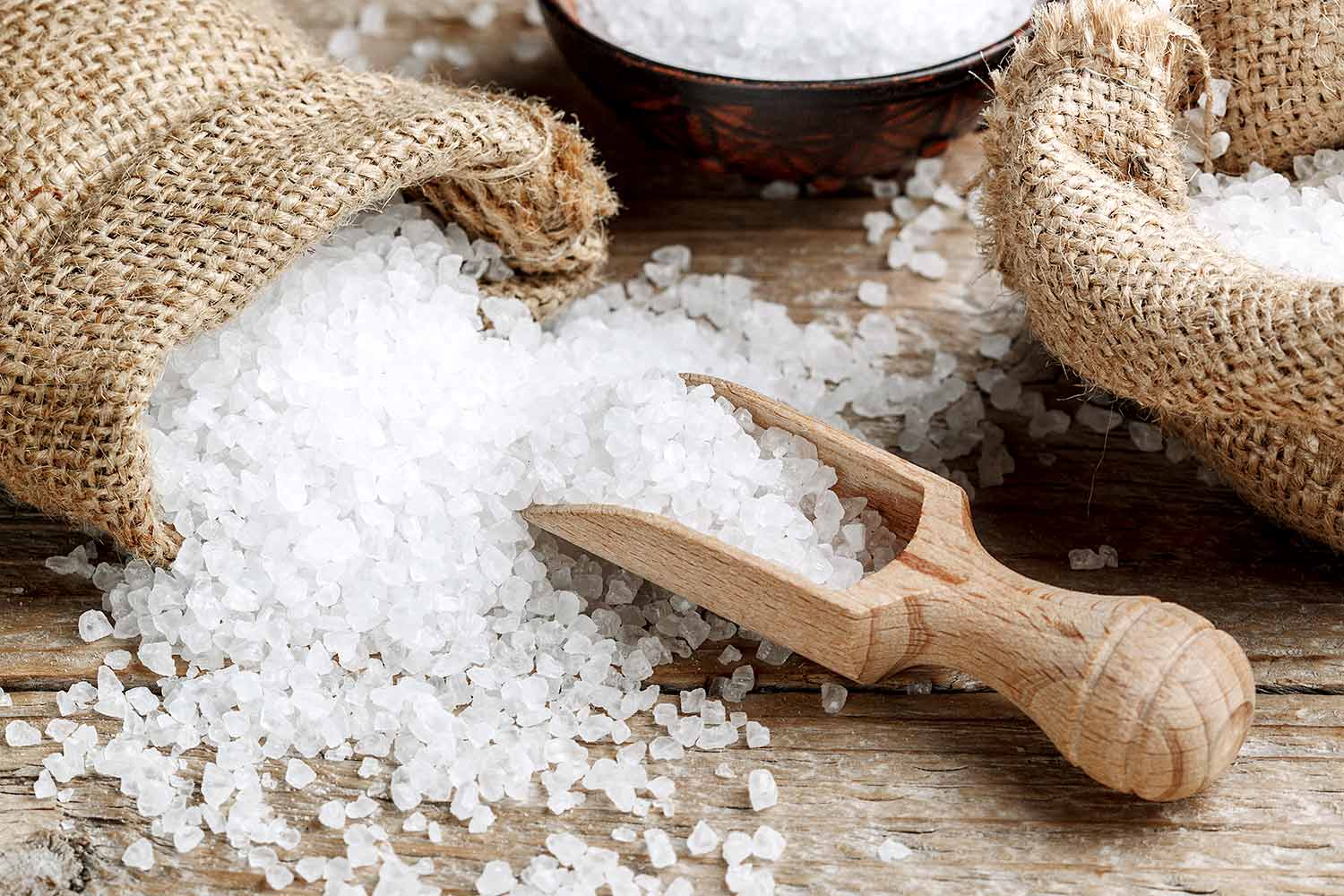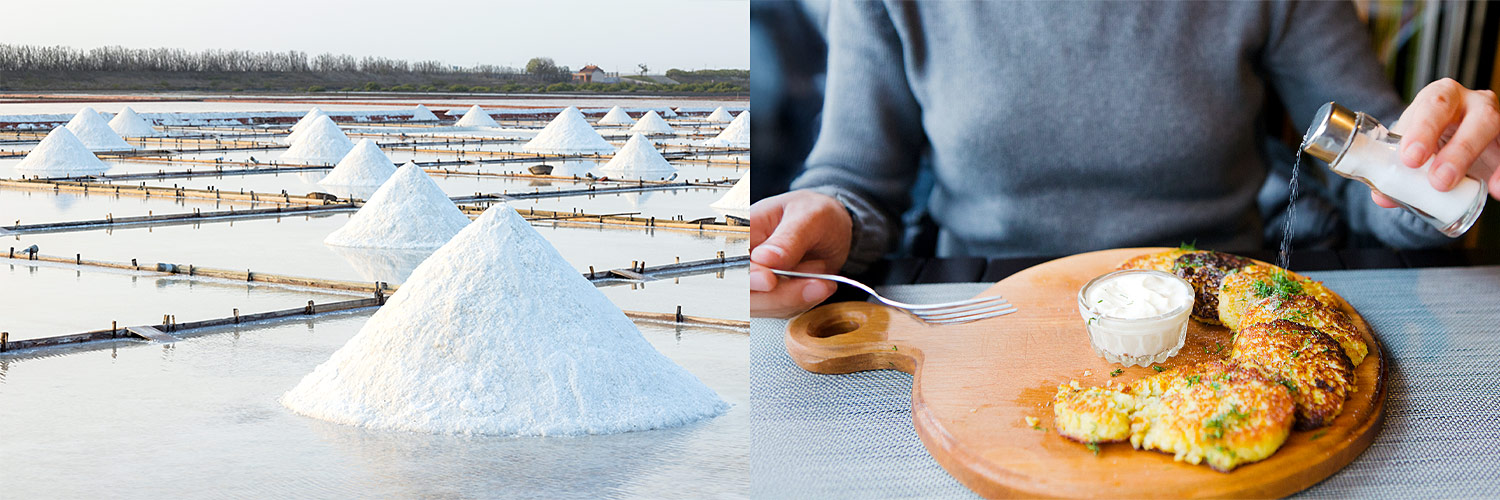There is something that is in the soil, rocks, butterflies, elephants, blood, muscles, and even in amniotic fluid. What is this? It is salt. Now it is easy to get salt thanks to the development of techniques which produce salt artificially. However, in the past, salt received special treatment, so there was even a saying in Korea, “A salt seller is better than a governor.” Salt has been with humans throughout history and playing an important role. Now, let’s learn about the value of salt.
Salt and History
In the primitive ages when humans lived by hunting, they were able to ingest salt by hunting and eating fish or birds. However, as they began to farm and grain became the staple food, they could no longer be supplied with enough amount of salt the body requires. Moreover, the increase of the intake of potassium through plants required an intake of more amount of salt. In other words, humans now had to ingest extra salt. So, people who lived in the mountains or inland started gathering around the seashore where they could get salt or around salt mines or salt lakes in order to exchange their agricultural products with salt. Afterwards, the regions where salt is produced became the center of trades.

In the past, salt was used as currency. The ancient Greeks traded slaves with salt, and soldiers and governors were paid with salt in Rome. The word salary is from the Latin word salarium, originally meaning salt money, denoting a soldier’s allowance to buy salt. In the 12th century, salt got a nickname “white gold” in Ghana as it was as precious as the same amount of pure gold produced in Morocco.
People’s effort to get salt continued for a long time. Wars broke out to conquer the land where salt is buried, and some people went for an expedition, looking for a new place where they could get salt; because they could become rich if they found salt rocks from the ground and sold them for a high price because of the scarcity of salt. The excavation technology to dig for salt has led to the technology to dig out oil. As oil is often buried under salt, sometimes oil was found while digging for salt.
Salt Sustains Life
Salt (NaCl) that is absorbed inside the body is separated into sodium ion and chloride ion. The chloride ion is one of the elements that are essential for all living things. The chloride ion, which is most abundant in extracellular fluid, takes part in maintaining homeostasis such as controlling osmotic pressure and pH inside cells. The body controls osmotic pressure, keeping the amount of moisture in balance inside the body, and it also controls the amount of body fluid such as blood.
Sodium ion also affects maintaining the balance of the density level of amniotic fluid while the fetus is inside the womb for nine months. It’s because the amniotic fluid which protects the baby is from the mother’s plasma. In the third trimester, the elements and salinity of the amniotic fluid become as dense as that of the seawater.
Also, sodium becomes an ingredient of alkaline digestive fluids such as the bile, pancreatic juice, and intestinal juices, and it helps with digestion and absorption of ingested food. If the amount of intake of salt is not enough, it causes dehydration because of the difficulty of absorption of water, which results in the decrease of appetite due to the decrease of the secretion of digestive fluid.
The sodium ion is necessary for the transmission of nerve impulses. Tens of thousands of sodium-potassium pumps are attached to cell membranes inside our bodies. By using energy, these pumps mediate the communication of the cells by pushing sodium ions outside the cells and pushing potassium ions into the cells. This way, nerve impulses are transmitted, and muscles are contracted.
The Secret of 3%
Seawater that enters the mouth by chance while swimming at the beach is salty unlike fresh water. Why is seawater salty? Is it because the magic millstone that produced salt once upon a time sank to the bottom of the ocean? The reason why seawater is salty is that it contains a large amount of sodium chloride. Sodium chloride, which is a combination of sodium and chloride, has no flavor. However, when it dissolves in the water and is separated into chloride ion and sodium ion, the sodium ion has a salty flavor. It varies, depending on the regions, but the average salinity of seawater is about 35 ppt. It means there are about 35 grams [1.2 oz] of salt per kilogram [2.2 lbs] of seawater.
Not only the salinity, but also the temperature of the seawater varies, depending on the regions. Generally, the temperature of the seawater near the equator is about 30°C [102°F], but the temperature of the Arctic Ocean goes down to –2ºC [28°F]. If the seawater freezes and the circulation of the seawater stops, the movement of warm water and cold water is blocked, and unusual weather phenomena will occur because the temperature difference between the equator and the polar regions becomes greater.
Fortunately, seawater starts freezing at approximately –2ºC [28°F], not at 0ºC [32°F]. It is because the 3% salt that is dissolved in the seawater lowers the freezing point of the seawater. Moreover, since the oceans are so big and deep, it takes a long time for the whole ocean water to go below –2ºC [28°F]. The average temperature of seawater is about 17.5ºC [63.5°F]. Before the water temperature goes down to the freezing point, the warm season starts. This is why seawater does not freeze. The temperature is not the only factor that prevents the seawater from freezing, but the constant move of the seawater due to the waves, sea current, and tidal current also contributes to the prevention of freezing.

The surface of the ocean constantly flows by the influence of Earth’s rotation and the wind. Seawater sinks to the deep ocean or rises to the surface according to the density difference due to the differences of the water temperature and salinity. In the North Atlantic, water freezes and salt remains when the cold winter comes, resulting in the rise of the salinity of seawater. When a tremendous amount of seawater becomes heavy as the density goes up, it sinks to the bottom of the ocean, and the empty spot is filled with different water; cold and heavy water in the north sinks, and warm water in the south fills in the spot, causing a huge flow of ocean water.
The sunken seawater flows across the equator and circulates through the Pacific Ocean, the Indian Ocean, and the Atlantic. During this process, the seawater of the warm tropical regions flows into cold polar regions along with the surface layer current; and the seawater of the cold polar regions flows into tropical regions. It keeps circulating heat so that a certain part of the ocean does not keep getting hot or cold. Like this, the ocean currents play the role of mixing the ocean water of the whole earth, and it also affects Earth’s climate by circulating the heat.
What people are most concerned about today is the melting of the glaciers in the polar regions due to global warming. If the glaciers melt, the salt concentration of the seawater in the polar regions becomes diluted, lowering its density, which causes the circulation of the ocean currents to stop. If the deep ocean currents do not start, the warm surface layer current which starts from the equator cannot travel to the polar regions, causing the prevention of the circulation of Earth’s heat. The 3% salt dissolved in the seawater affects the climate changes of the whole earth.

Salt is so important that it even controlled history from the ancient times. It is directly related to our lives as a material that is essential for mankind. People have been using salt to season food and to store food. Salt makes a sweet flavor less sweet and a bitter flavor less bitter. Artificial seasoning that gives a sweet taste has been invented to replace sugar, but no replacement has been invented for salt. This is probably why salt is often used to describe something precious and essential. What about being someone who shines their value just like the salt which does not lose its saltiness wherever it is.
“You are the salt of the earth. But if the salt loses its saltiness, how can it be made salty again? It is no longer good for anything, except to be thrown out and trampled by men.” Mt 5:13
“Salt is good, but if it loses its saltiness, how can you make it salty again? Have salt in yourselves, and be at peace with each other.” Mk 9:50